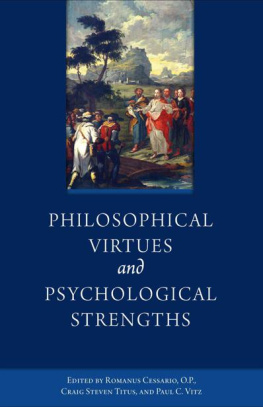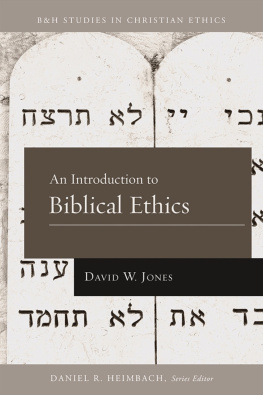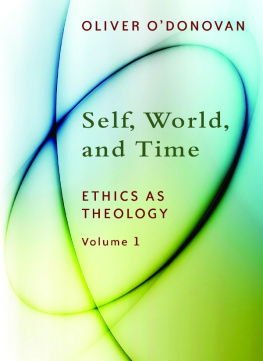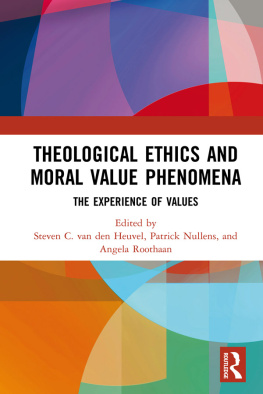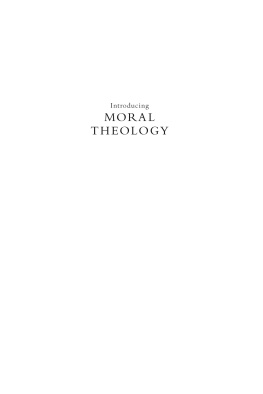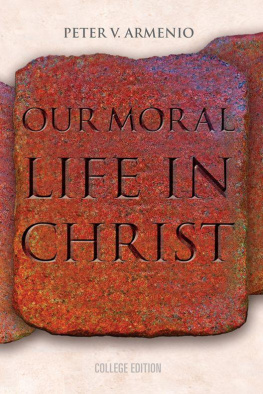To live is Christ (Phil 1:21). This book represents the fruit of two decades of teaching moral theology in Catholic settings. I acknowledge especially the support and invaluable assistance given, most recently, by the Reverend Monsignors Richard G. Lennon, Rector, and Laurence W. McGrath, Librarian, at Saint John's Seminary (Brighton, Massachusetts). Sister Susan Heinemann, O.P., Monastery of Our Lady of Grace (North Guilford, Connecticut) transformed the text into a useful instrument by her meticulous indexing. My gratitude to her extends also to those other Dominican nuns who have been a source of special encouragement. The initiative for this volume and the series it initiates came from Dr. David J. McGonagle at the Catholic University of America Press. His co-workers, the Mmes. Susan Needham and Elizabeth Benevides, have exhibited a spirit of dedication that transcends what professional responsibility imposes. This volume is dedicated to His Eminence, Bernard Cardinal Law, Archbishop of Boston, who has helped so many people throughout the world learn the meaning of to live is Christ, especially by his promotion of the Catechism of the Catholic Church. The ninth anniversary of its publication this year coincides with the Cardinal's seventieth birthday. Ad multos annos.
Introduction
The present volume introduces a series of textbooks which aims to provide upper division and graduate students with a well-rounded and readable account of the principal branches of moral theology according to the way that the discipline has actually developed and is now practiced within the Roman Catholic tradition.
Each volume in the Catholic Moral Thought Series is designed to provide students with a comprehensive presentation of both the principles of Christian conduct and the specific teachings and precepts for fulfilling the requirements of the Christian life. The authoritative statements of the Roman Catholic Church supply the normative principles for determining what constitutes these basic elements of moral theology. Although the several authors who contribute to the series have been trained in various approaches to and outlooks on Christian ethics and moral theology, they each agree that it is impossible to develop successfully a moral theology without first holding by divine and Catholic faith to the once and for all divine revelation that the Church of Christ safeguards for every generation. Soundly based, then, in the teaching of the Church, the volumes of the series will set out in depth, in a manner and style suitable for scholars, students, and general readers, the basic principles of Catholic moral thought and the application of those principles within areas of ethical concern that are of paramount importance today.
For theological reasoning to illuminate honestly and explicate adequately Theologians enjoy the responsibility of helping the Church safeguard the deposit of faith (depositum fidei), so that the bonds of unity in the apostolic faith will continue to grow extensively and develop coherently. The authors who contribute to this series seek to fulfill this mission for the benefit of those who will use the volumes of Catholic Moral Thought, normally but not necessarily under the tutelage of a person trained in theology.
In order to introduce this series, I want first to say something about the current climate, at once cultural and ideological, that attends any consideration of moral theology today; secondly I will describe the series generically; and finally I will offer a summary-analysis of the present volume.
I
It has been observed that the Catholic moral theologian is obliged to carry out in the midst of a largely alien cultural environment the responsibility confided to him or her by the Church. Because of the shaping forces active in contemporary culture, insisting on the perennial validity of norms for human conduct, especially those precepts that, because of their necessary relation to fostering the good of the human person, allow for no exception, has generated a challenging project. Even secular authors recognize both the dominant cultural attitudes and the risks inherent in allowing them to remain unchallenged. For instance, Alan Wolfe has observed that while most Americans want to decide for themselves what is right, good, and meaningful, this kind of autonomy When one accedes to the abandonment of metaphysical study that the ultimate human questions impose on the human spirit, he pays the price.
One conclusion that has emerged among some theologians active in the post-conciliar period is that Enlightenment views about autonomy are difficult, if not impossible, to reconcile with the demands of Christian discipleship. Furthermore, it is little appreciated to what extent peculiarly modern versions of individual liberty are able to thwart the power inherent in moral action to unite human beings in achieving common goals that embody the goods of excellence. The Gospel announces that human communion achieves its summit in a divinely initiated communion of charity. This means that the deleterious effects of an alleged conflict between enjoying freedom and pursing the good threaten directly what the Christian believer holds most dear, namely, life in Christ. As the device for the Vatican newspaper, L'Osservatore Romano, reminds us, the Church of Christ is committed to ensuring that to each his own will not prevail (unicuique suum non praevalebunt).
Exaggerated conceptions of human freedom, when allowed to govern a Christian's spiritual life, undermine even those moral actions strengthened by the virtue of charity. When reliance on God is removed from the practice of the moral life, the theological virtues are impeded, as the Catechism says, from providing the foundation of Christian moral activity (1813). The confusion that arises from competing claims about what constitutes human freedom and what perfects human nature intrudes into every area of the Christian life. Because of this situation, the need for sound instruction in each branch of moral theology acquires a new urgency.
The great advantage that an authentically Christian moral theology affords the believer derives principally from the fact that moral teaching is located within a larger picture of saving doctrine. As the very ordering Because moral truth conforms to God's very own wisdom, it remains a hallmark of Catholic moral instruction that it never adopts the shrill tones of high-minded moralizing. Following the example of Christ, then, the Catholic moralist welcomes the contemporary scene, for it presents a challenge that enlightens even as it burdens.


